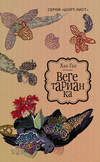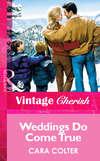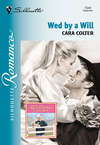Czytaj książkę: «His Mistletoe Bride»
The sled veered unexpectedly. Brody landed in a heap, and Lila landed with a fierce thump on top of him.
He looked up into the laughter of her eyes, the joy on her face, and he let himself have it. He let himself have this moment.
Something inside of him let go: his need to protect himself, his need to be in control, his need to not ever be hurt again.
He looked into Lila’s shining face and he could clearly see she had risen to the challenge of allowing her heart to be made braver. She was welcoming whatever was happening between them.
He let go of his own desire to run from it. If she could be so brave, than he could be too.
It was not the kind of bravery that reached into a burning car and pulled out a woman stuck behind the steering wheel.
No, it was not that kind of bravery. That kind of bravery had its place.
But it did not hold a candle to the kind of bravery that was being asked of him now. To put his heart at risk. To say yes to the mystery of something bigger than he could control. Say yes to what was in the laughter of her eyes, and the way she had rested against his chest last night.
To say yes to life.
Cara Colter lives on an acreage in British Columbia with her partner, Rob, and eleven horses. She has three grown children and a grandson. She is a recent recipient of the Romantic Times BOOKreviews Career Achievement Award in the ‘Love and Laughter’ category. Cara loves to hear from readers, and you can contact her, or learn more about her, through her website: www.cara-colter.com
Dear Reader
There is something about turning fifty (two days after Christmas for me), that makes a person ask: have I used my life wisely? Have I done enough? Been enough? Have I achieved the things I hoped to achieve?
Sometimes answers come in unexpected ways. As I was working on this Christmas story, I heard Josh Groban sing ‘The Little Drummer Boy’.
It was such a beautiful reminder that we are all given a gift—perhaps humble, perhaps grand—and it is not the gift itself that matters, but how we use it.
I recall a waiter so wonderful I still remember him with more delight than the musical concert that followed; I have a hair stylist who loves her work so absolutely it is pure pleasure to see what she’ll do this time; I was at a hotel in Mexico where the maid radiated good cheer and amazed us over and over by sculpting the bathroom towels into swans and boats and other creations.
If you bring your heart to what you do, no matter what that is, it becomes a gift to others. And to Him. That is my intention with each story I write. May it bring joy.
With holiday wishes
Cara Colter
HIS MISTLETOE BRIDE
BY
CARA COLTER
To Pat Walls,
a man dedicated to family,
and a true romantic even after forty years!
CHAPTER ONE
OFFICER BRODY TAGGERT decided he was upgrading his mood from cranky to just plain foul.
“As good a time as any to go see Miss L. Toe,” he said, out loud, heavy on the sarcasm as he said the name. Tag’s dog, Boo, the only other inhabitant of the police cruiser, who was stretched out comfortably in the backseat, woofed what Tag took as agreement.
Actually, Tag thought, given his mood, now was probably not the best time to go see Snow Mountain’s newest business owner, resident, budding author and pain in the butt.
Unfortunately the new-in-town Lila Grainger, aka Miss L. Toe, unlike most people Tag ran into who had an alias—an also known as—was not a criminal at all. She was the chief of police’s niece.
Which was the reason Tag had to go see her.
Directly ordered.
Tag’s boss, Chief Paul Hutchinson “Hutch,” was notoriously mild-mannered, but he had a core of pure steel and he had not been amused that Tag had missed the first ever meeting of the Save Christmas in Snow Mountain Committee last night.
“She’s up to something,” the chief had muttered. “She’s crafty, just like my sister, her mother. And you missed the meeting, so now we’re in the dark.”
Tag decided not to point out that in the dark was a particularly bad choice of phrase, since that was what had ignited the Christmas fervor in Snow Mountain in the first place.
Town Council had decided to turn off the lights. The Christmas lights, that was. And the traditional Christmas display in the tiny Bandstand Park that was at the end of Main Street was to be no more.
Every year since 1957, the park had been transformed into Santa’s Workshop. Ingenious motorized elves made toys and wrapped gifts, reindeer cavorted and Santa ho-ho-hoed and waved. But those particular models of elves and reindeer did not have fifty-year life spans.
Santa’s ho-ho-ho had gone into slow mo. Last year one of the elves had seriously overheated and burst into flames. Unfortunately, someone with a cell phone camera had caught on film a child wailing in fear, his face dramatically backlit by the flickering blaze, and Snow Mountain had been put on the map.
The whole issue had been causing heated debates since last January. But at the October Town Council meeting, Leonard Lemoix, who was not Tag’s favorite councilor, had gone where no one had gone before. Leonard had crunched the numbers. The cost of the much-needed repairs, setting up, and taking down of the display could, in three years, added up to enough money to buy a new police cruiser.
That didn’t even include the cost of the power bill for running the Christmas lights, which were not the new energy-efficient variety, for between six and eight weeks every year.
Town Council had voted unanimously to shut down the display and Leonard had gone up a notch or two in Tag’s estimation.
“My niece thinks it’s my fault,” the chief had said glumly the day after the meeting. “I didn’t know anything about the police cruiser. Now Lila’s starting a committee to keep Christmas in Snow Mountain. You know what she said to me? Uncle Paul, do you want Snow Mountain to be known as the town that canceled Christmas?”
That’s when Tag found out he’d been volunteered to be on the committee.
“We can’t have the department looking like villains who want to trade Christmas for a new police cruiser,” Hutch said. The chief’s increasing concern about image seemed to coincide with the arrival of his niece, too.
Lila was a city girl from Miami, and was very savvy about what was and wasn’t politically correct.
Despite the fact Tag was developing a dislike for the niece he had not yet met, he knew better than to bother to protest, why me? about his appointment to Lila Grainger’s committee. After six years on the force he was still, unfortunately, its most recent recruit.
He had shaken the title of rookie, and finally refused to carry the humbling joke badge he’d been required to produce at the whim of anyone senior on the force that said, Be patient, I’m new here, but he still got every single assignment that no one else wanted.
Which described the committee to keep Christmas in Snow Mountain to a T. Karl Jamison, the oldest man on the force, kept threatening to retire, which meant there would be a new rookie someday, but not in time, obviously, to save Tag from being at the whim of Hutch’s niece.
And now he’d missed her first damned meeting.
Tag had not bothered to offer excuses for his absence at the meeting. He felt his reason for not being there fell into the personal and very private category, and the truth was he would rather face his boss’s wrath than his pity. After the death of his younger brother, Ethan, Tag had handled about all the sympathy he could for one lifetime.
Still, he knew now there would be no acceptable excuse—short of an armed robbery in progress—for not going to see Miss L. Toe, aka Lila Grainger, now, tonight, immediately.
Tag swore softly. The dog moaned anxiously, able to detect the downward-spiraling mood in the patrol car.
“It’s not your fault, Boo.”
The coming of Christmas was not the dog’s fault. But with Halloween only a few weeks past, and Thanksgiving not yet here, Tag could have ignored the inevitable coming of the season for a little while longer.
Okay, he’d been glad when the town voted against the Christmas display, and not entirely because of the possibility of a new cruiser, either.
In his line of work, Brody Taggert saw the other side of Christmas, the side that did not make the front cover of the holiday editions of all the glitzy magazines. He saw what no one ever wanted to acknowledge: the season of joy and faith and miracles had a dirty underbelly, fallout.
As a cop, even a small-town cop, Tag saw firsthand that it was a time of accelerated stress for the people he dealt with most. Soon, after the Thanksgiving turkeys were cleared away, Christmas drinking would begin in earnest. Earnest drinking led to serious trouble: arguments, fights, domestic violence, car accidents, hypothermia, drunken dismantling of business establishments and homes and lives.
This was the conclusion Tag had reached about Christmas: poor people would feel poorer, lonely people would feel lonelier, desperate people more desperate, mean people meaner.
And of course, anyone who had ever known sorrow, as Tag himself knew sorrow, would feel the ache of that loss all over again, as if it were brand-new. This would be Tag’s seventh Christmas without his brother. People had assured him that time would heal his wounds, but this seventh Christmas did not feel any different than the first: bleak, instead of joyous. There was an empty hole in his life that seemed to be made emptier by all the activity and excited anticipation building around him.
But that wasn’t Lila Grainger’s world.
He’d had a nauseating peek into her world when he’d received her first enthusiastic committee announcement via e-mail three days ago. Animated snowmen danced across a pink background that implored him: Save Christmas In Snow Mountain.
Action Meeting, Free Eggnog And Jeanie Harper’s Nearly World Famous Shortbread Cookies.
The dancing snowmen had been particularly irritating to a guy whose computer skills ran to grave satisfaction that he had finally figured out the station’s computers were equipped with spelling checkers.
But irritation at the whole concept, and dancing snowmen aside, Tag really had intended to go, and not just because he’d been told it was a good idea, either. The promise of Jeanie’s shortbread was more bait than any bachelor could resist, particularly if they were the cookies that she dipped half in chocolate, which they almost always were at this time of year.
But life—real life, not the chocolate-dipped dancing snowmen variety—had intervened. He sought out his dog in the rearview mirror. Tag had missed the meeting because he’d taken Boo to see a veterinary specialist in Spokane yesterday afternoon.
The truth was he’d been back in plenty of time to make the seven o’clock gathering, but after a man had heard the words, You’ll know when it’s time, he couldn’t go. Not didn’t want to—couldn’t.
Tag was a man who had cleaned up the aftermath of a lot of ugliness, he prided himself on having total control over his emotions. But not even the world’s best shortbread cookies could have enticed him off his couch last night. His forty-two-inch flat screen and a hockey game, Boo resting on his lap, had helped him block out his sense of helplessness in the face of the doctor’s diagnosis.
Boo was dying. Boo, not just a dog, but a link to his brother; even more than that, a link to life. More than time, it was Boo who had healed in Tag what could be healed.
What Tag hadn’t been expecting was how swiftly the chief would react to his absence to Lila’s meeting.
He’d been called in to see the chief at the start of his shift, and told he’d better get with the program.
The Save Christmas in Snow Mountain program that was.
Tag was pretty sure if he read over his job description and contract there was nothing in there about having to cooperate with the fruitcake plans of the chief’s niece, even if it was going to be good for the police department’s image, as Hutch claimed.
The word image, up until this point in the department’s history, had meant being nice to little kids, keeping a crisp uniform, polished shoes and a clean car and Tag would have been content if it stayed that way forever.
He was also pretty sure there was nothing in his contract about cleaning cells if he didn’t comply, either.
On the other hand, Hutch had thrown Tag a lifeline, offering him a job on the police department when Tag had just about swamped himself in misery, had been heading down a wrong road fast, after Ethan’s accident.
The chief had also known, without ever saying one word to indicate that he knew, that he and Boo were partners in the rescue of Tag’s troubled soul and so he had turned a blind eye to the dog riding in the backseat. Tag knew he owed Hutch, and owed him dearly.
He turned the patrol car down Main Street. It was just dusk, and the icy winds of mid-November were beginning to blow down Snow Mountain, the black, jagged silhouette forming a backdrop for the town.
Dry leaves and a few newspapers blew down a street lined by single-story brick-and-sandstone businesses that had largely seen a better day. Tilley’s Dry Goods had had Going Out Of Business soaped on the windows for at least ten years.
The “D” in the Mountain Drugstore sign was burned out, the odd summertime tourist ventured in there expecting rugs. There were no wintertime tourists, something the optimistic Miss Grainger thought would be a cinch to change.
According to her vibrant pink e-mail, Snow Mountain could not only revive its Christmas display of Santa’s Workshop in Bandstand Park, but become a Destination, the capital “D” emphasized with both bold lettering and neon-green.
But as Tag watched the lights winking out, one by one, on Main Street, he thought this was probably the town least likely to ever be a Destination. In fact, he was aware of thinking it wasn’t the prettiest picture of small-town U.S.A. that he had ever seen. He was also aware of missing the garish display of lights and moving figurines in the park at the end of the street just the tiniest little bit.
Lila Grainger’s store, of course, was a shining jewel in the middle of that street, the one-hundred-year-old limestone recently sandblasted back to soft, buffed ivory, the new sign hanging above it, green, red and white, saying in tasteful letters, Miss. L. Toe, and in smaller letters underneath it, The Christmas Store At Snow Mountain.
Miss. L. Toe. Cute. Nauseatingly so. Welcome to her world. The opening of the store lent itself to motive, too. Lila Grainger had a vested interest in keeping the Christmas in Snow Mountain, now that she’d invested her whole book advance in opening a store here.
When she’d signed a contract to write a book about Christmas, the chief had practically sent out announcement cards he’d been so pleased and proud. Then, unexpectedly, she’d decided to move here from Florida and invest her windfall in this old building.
Tag had yet to meet her, but he had formed a picture of the kind of person who opened a year-round Christmas store on what seemed to be a whim: scrawny, wire-rim glasses, flowered dress, blue eyes spilling over moistly with that do-gooder glow.
The store windows, cleaned until they sparkled, were filled with fairy tale like displays that confirmed his worst suspicions. Mrs. Santa incarnate had arrived in Snow Mountain. One gigantic window display contained an entire town in miniature, completely decked out for Christmas. A train moved through it; he could hear the muffled choo-choo of the whistle right through the plate glass.
The other window contained a tree, at least seven feet tall, decorated entirely and in his mind, hideously, in various shades of purple.
It was a fantasy, not appealing at all to a man who spent the days of his life dealing with harsh reality.
“I’m getting a headache,” Tag admitted to the dog as he reached over to the seat beside him, put on his hat, pulled the shiny black brim low over his eyes.
The dog whined.
“You are not coming in.”
Boo, who usually obeyed instantly and without argument, ignored him, hurtled over the seat into the front of the car and was out the door as soon as Tag opened it.
The dog sat on the sidewalk, and waited, her tail thumping enthusiastically. Tag looked at her, the world’s ugliest dog, and felt the downward swoop of his heart.
Cancer. Who knew dogs got cancer?
Boo, the exact color of a mud puddle, had the head of a Great Dane, the body of a Chinese Shar-pei, and the legs of a dachshund. There was nothing the least bit “cute” about the combination of a wrinkled dog with a painfully oversize head waddling around on very crooked and too-short legs.
Tag knew darn well that the visit to the specialist’s office, the promise that his Christmases were about to get worse than ever, rather than better, was the real reason his mood was blacker than the silhouette of Snow Mountain. Since he could change nothing, especially not the mood, there was no sense letting it go to waste. The rawness of his own hurt was under control tonight, as it had not been last night.
He felt a moment’s sympathy for Miss L. Toe, having to face him when he was in this frame of mind, but then he quelled it.
He debated wrestling Boo back into the car, but the dog had an amazing instinct for people: Boo could tell good from bad with such telepathic accuracy it was spooky. Even before the dog saw a person, while Tag was still sitting in his cruiser running a license plate, Boo would be watching intently, sniffing the air, “sensing” things unseen.
The truth was people, even ones as cynical as Tag, could be fooled.
They could be fooled by a pretty face or an angelic air, by white hair and granny glasses, by adolescent awkwardness, by words, by body language.
Not Boo. The hackles on the dog’s neck rose when something—or someone—needed a second look, and she grinned the silliest grin when everything was all right. Tag did not substitute her judgment for his own, but the world’s ugliest dog had an uncanny knack for letting him know when he’d missed something.
She wasn’t officially a K-9, but she was unofficially the mascot of the Snow Mountain Police Department.
So, why not see how she would react to the chief’s niece? Just for interest’s sake, nothing more. Lila Grainger’s appearance and the opening of her store seemed mysterious and sudden, as if Tag needed to be any warier than he was of the woman he had never even laid eyes on. Still, the chief was usually a talker—you couldn’t shut him up when she’d signed the book deal—but he’d said nothing about his niece’s arrival in town until she had gotten here.
Tag ignored the big No Dogs Allowed sign posted on the door, since just about everyone in Snow Mountain knew Boo was more human than dog anyway, and pulled the brass handle on the heavy walnut and glass door. He stepped in. A sleigh bell jingled a greeting and he was enveloped by smells of Christmas: candy cane, mint, pumpkin pie, incense, spices, pine.
Scent, he had found, was the most powerful of triggers and the aromas swamped him in memories of what his life had once felt like and had once been. A longing for the sweet, uncomplicated days of the past enveloped him. For a moment he could almost see his brother, Ethan, at about age six, tearing into a train set not unlike that one that chugged around the window.
He shook off the feeling of melancholy, liking crankiness better. A carol played loudly, old school Bing Crosby, and everywhere he looked Tag saw the highly breakable paraphernalia of the season. He warned Boo, with a finger, not to move.
At the far end of the store, a slight figure sat behind a counter had her back to the door and was typing furiously. She had not heard him come in over the high-volume crooning of Bing and her own intensity, and he studied her, frowning. No flowered dress?
In fact, the woman seemed to be wearing low-rider jeans that were slipping to show quite a bit of naked and very slender lower back. Tendrils of blond hair, the color of fall grass streaked with liquid honey, had escaped a clasp and teased the top of a delicate neck.
Tag’s first thought was that it couldn’t be the chief’s niece. Hutch had a town full of relatives, not a niece or nephew under forty. This girl looked like she was about eighteen.
The wind picked that moment to send a vicious gust down Main Street, and it sucked the door out of his hand and slammed it so hard even the dog flinched.
The woman, who had just reached for her coffee mug, started, and the glass dropped from fingers that had not quite grasped it, and shattered on the newly refurbished hardwood floor.
She leaped from the chair, and whirled to face him, one hand over her heart, the other reaching frantically for the three-foot-high striped candy cane decoration in a box beside her.
She held it like a weapon, and he might have laughed at what a ridiculous defense a candy cane was, except that somehow the picture of his brother ripping into Christmas parcels was still with him, as was his agony over Boo, and his laughter felt as dried up as those fall leaves blowing down Main Street.
Miss Mary Christmas was not eighteen after all, but midtwenties maybe.
And her eyes were genuinely fear-glazed, in sharp contrast to the pretty joy and light world she had created in her store. She registered his uniform and her hold on the candy cane relaxed, but only marginally.
She was dressed casually, but her outfit showed off feminine curves so appealing it pierced the armor of his hurt, which made him frown. She wore hip-hugging jeans, a red sweater over a white shirt, the tails and collar sticking out. She was sock-footed, which for some reason took him off guard, an intimacy at odds with the store surroundings.
“Sorry,” she said, “you startled me.”
No kidding.
He glanced down at Boo who did something he had never seen before: laid down and began to hum, deep in her throat, not a growl, a strange lullaby. He stared at the dog, flummoxed, hoping this was not the next stage in the diagnosis the doctor had given him yesterday.
He looked back up, as confused by her as he had been by the dog’s strange humming.
She was young and beautiful, like one of those angels they sold to top the Christmas tree. Her Florida skin was only faintly sun-kissed, flawless as porcelain, her bone structure was gorgeous, but fragile, and eyes huge and china-blue fastened on his face. He could see where her pulse still beat frantically in her neck.
“You must be Miss Grainger,” he said, despite the fact he’d been determined to address her as Miss L. Toe. Now he was aware of keeping his voice deliberately soft, his reasons for being here, nebulous to begin with, even more blurred by the fear he saw in her.
“Lila,” she insisted brightly.
The chief’s niece did not have the chunky build of the rest of the Hutchinson clan. In fact, he was aware of feeling guilty even thinking it about the chief’s niece, but she was subtly but undeniably, well, sexy.
She was trying to make it look like she wasn’t afraid anymore, but he could tell she still was, so he tried to tame his frown, and canned his plans to take out his bad mood on her.
He was in a business where he got thrown plenty of curveballs, but he had never developed a liking for being caught off guard, surprised, and the chief’s niece was a surprise.
He’d been around enough fear to recognize the real McCoy, and to see wariness still haunted her eyes, despite his uniform. Or maybe because of it. Lots of people were afraid of police. He kept the space between them, but Boo began to wiggle forward on her belly, still humming happily. Tag snapped his finger at his dog, pointed at his feet.
Boo gave him a pleading look over her shoulder, then flopped over on her back and pointed all four feet in the air.
Lila Grainger’s eyes left his face for the first time. Despite his uniform, he had the feeling she would bolt for the back if he made one move toward her. But when she looked at Boo, she smiled, and some finely held tension left her.
“What an adorable dog.”
Maybe that explained her overreaction to the slamming of the door. Visual impairment. Boo was about the furthest thing from adorable on the planet!
An upside-down paw waved at her, and Lila Grainger laughed, proving she could see just fine, and that she was even sexier than he had first thought, which was unfortunate, because he’d rated her plenty sexy on that first glance.
“I missed the meeting last night,” Tag said, getting down to business. He folded his arms over his chest, to make himself look big and remote, not a man in the least moved by the sexiness of strangers.
“Meeting?” she stammered, uneasily.
“I’ve been assigned to the Committee.” He wanted to make that very plain. Assigned. Not volunteered.
“Oh, that meeting,” she said too hastily, and tucked a wisp of that feathery hair behind her ear, “That’s fine. We have enough people. More than enough. You look like a busy guy. No time for this type of thing. But thanks for dropping by. There’s some leftover shortbread by the cash register. Go ahead and take some.”
She was trying to get rid of him. Even with the distraction of the cookies, which he stole a glance at and saw were chocolate dipped, and with the further distraction of that wisp of hair popping back out from behind her ear, the policeman in him went on red alert as her eyes shifted uneasily to the right. The chief had been right. She was up to something. Something that she didn’t want him to know about.
He was really watching her now. Every detail suddenly interested him, including ones that had nothing to do with what she might be trying to hide, like the fact she had faint circles under her eyes, as if she had trouble sleeping, and the fact that her ring finger was empty.
She was single. Miss L. Toe not Mrs. L. Toe. There was absolutely no reason he should feel uneasy about that. He didn’t do the relationship thing. He’d become a master at ignoring that initial twitch of interest that could lead a man into that quicksand world of caring.
At his brother’s funeral, six and a half years ago, the minister had said, All love leads to loss. Somehow it had become a credo Tag lived by—the dog had wormed her way by his defenses, but no one else.
And now, Boo, too, was going to drive the point home. That to develop attachments, to care about anything, even a dog, made a man vulnerable, stole his power from him as surely as Delilah had stolen Sampson’s hair.
Not that he could indulge in such introspection right now. He made himself not look at Boo, who was still waving her paw engagingly at Lila Grainger.
“Well, nice of you to drop in, Officer, um—”
“Taggert,” he supplied. What was causing her to feel such discomfort? He’d startled her, but there was more. He could sense it, even without Boo’s help. Her uncle had been absolutely right.
She was up to something.
Or else the news he’d gotten yesterday, and that sudden poignant memory of his brother tearing into that gift, had rattled him badly enough that he was jumping at shadows.
After all, what could she be up to that she wouldn’t want the police department—her uncle—to know about? She hardly looked like the type to decide to finance the saving of Christmas with a little illegal activity, like selling drugs or smuggling.
Still, Tag had a cop’s gift. He knew instinctively when people were hiding something, and she was.
“Have you got some minutes from the meeting?” he pushed, just a little.
“Minutes?” her voice became suspiciously squeaky. “Of course not. It was very informal.”
“So did you come up with a plan of action? For saving the Christmas display in Bandstand Park?”
“Oh,” Lila said, her voice filled with bright and very fake cheer again, “we just bounced some preliminary ideas around. You know.”
“I don’t,” he said uncooperatively.
“We changed the name. We’re going to call ourselves Save Our Snow Mountain Christmas. SOS for short.”
She looked at him like she expected his approval. When he said nothing she began to talk fast and nervously, another sure sign of a person who was being evasive.
“We might put up a tree. A big one,” she said in a rush, “just to keep the Christmas spirit alive until we can come up with some money and get the Santa’s Workshop display fixed. Or get the town to change their minds.”
She blushed when she said that, as if she was planning something naughty to get the town to change their minds, but just looking at her he could tell her idea of naughty and his would be completely different. He thought if she showed up in one of those red, fur-trimmed bikinis the town would do whatever the hell she wanted.
As if to prove how differently their minds worked, and that she was the girl least likely to ever wear a red fur-trimmed bikini, she said, “We might try putting a real Santa in the park on weekends.”
“There are no real Santas,” he said dryly, knowing with new conviction he was hearing only part of the story.
“I was thinking of asking that portly man who works with Uncle Paul. Do you think he’d do it for free?”
Portly was a very kind way to describe the most senior member of the Snow Mountain department.
“Jamison?” Tag asked, incredulously. “You want Karl Jamison to play Santa?”
Jamison, who was not portly, but obese, who chewed—and spat—tobacco, and who had the world’s largest off-color vocabulary thanks to ten years in the Marine Corp, was the man least likely to play Santa.
Darmowy fragment się skończył.





















